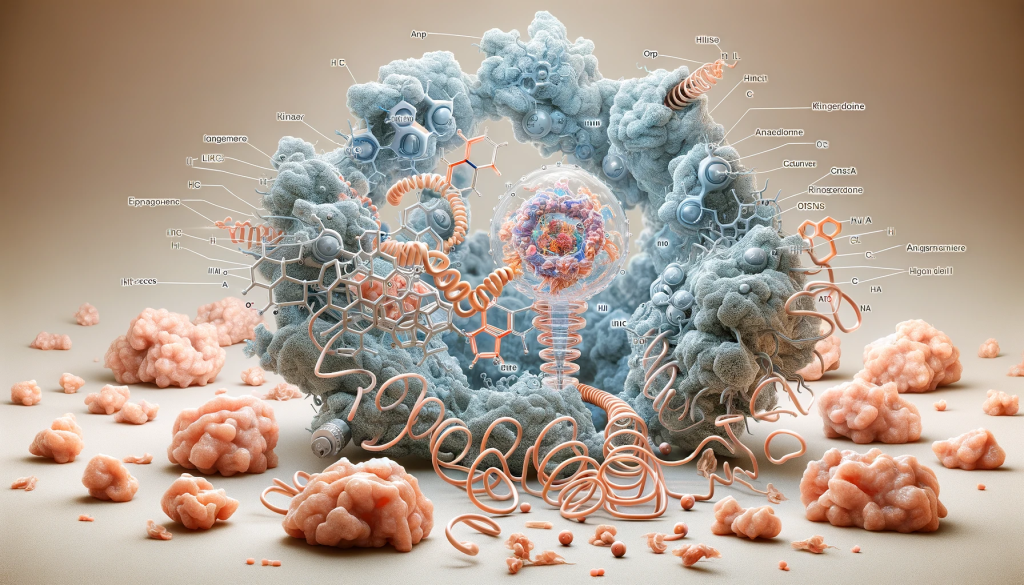The Role of ALK in NSCLC Therapy

What is an ALK rearrangement?
ALK stands for anaplastic lymphoma kinase. It is a gene that provides instructions for making a protein called ALK tyrosine kinase receptor. Roughly 3% to 7% of all NSCLC cases are identified as ALK-positive. When the ALK gene becomes rearranged, it can fuse with another gene, causing the ALK protein to be in a constant “turned on” state. This leads to uncontrolled cell growth and the development of cancer4.
The most common ALK rearrangement is between the ALK gene and a gene called EML4. This specific rearrangement is called EML4-ALK. However, ALK can fuse with over 20 other genes5.
What is the prognosis for ALK+ NSCLC?
The availability of several effective ALK inhibitor medications has greatly improved the outlook for patients with ALK+ NSCLC. Many experience significant tumor shrinkage and extended progression-free survival compared to chemotherapy9.
However, most patients eventually develop resistance to TKIs, requiring a switch to another ALK inhibitor. Researchers are working on new ALK inhibitors and combination therapies to further improve patient outcomes
The Role of ALK Inhibitors
ALK inhibitors have demonstrated superior efficacy compared to chemotherapy in the first-line setting for advanced ALK-positive NSCLC patients. In multiple randomized phase 3 trials, ALK inhibitors such as crizotinib, alectinib, brigatinib, and ceritinib have shown significantly improved progression-free survival and higher objective response rates compared to platinum-based chemotherapy12345. For example, in the ALEX trial, alectinib showed a median PFS of 34.8 months versus 10.9 months with crizotinib3. Similar PFS benefits with ALK inhibitors over chemotherapy ranging from 16-29 months versus 4-8 months have been seen across trials1245.
In addition to systemic efficacy, ALK inhibitors have shown intracranial efficacy in ALK-positive NSCLC patients with brain metastases. Studies have reported intracranial response rates of 35-85% with different ALK inhibitors in this population678. In particular, next-generation ALK inhibitors like alectinib, brigatinib and lorlatinib have demonstrated superior CNS penetration and control of brain metastases compared to crizotinib78. This is clinically meaningful given the high incidence of brain metastases in ALK-rearranged NSCLC.
Why test for ALK rearrangements?
Testing NSCLC tumors for ALK rearrangements is important because it guides treatment options. Patients who are ALK+ respond better to targeted therapy drugs called tyrosine kinase inhibitors (TKIs) rather than chemotherapy7.
FDA Approved TKIs for ALK+ NSCLC:
- Crizotinib (Xalkori) – 1st generation TKI
- Ceritinib (Zykadia) – 2nd generation
- Alectinib (Alecensa) – 2nd generation
- Brigatinib (Alunbrig) – 2nd generation
- Lorlatinib (Lorbrena) – 3rd generation
These oral medications can often effectively treat ALK+ NSCLC tumors with manageable side effects.
How are ALK rearrangements detected?
- FISH – A lab test that uses fluorescent probes to bind to the ALK gene and detect rearrangements. Considered the gold standard.
- IHC – Uses antibodies to detect abnormal ALK proteins. Widely available in pathology labs.
- NGS – Sequences the DNA in cancer cells to find gene rearrangements. Can assess multiple genes at once.
- PCR – Amplifies and analyzes ALK gene fragments to detect rearrangements. Fast and sensitive.
Recently Published ALK Positive Clinical Trial Results
Recent studies have shown encouraging results for Non-Small Cell Lung Cancer (NSCLC) treatments targeting Anaplastic Lymphoma Kinase (ALK). Highlights of these findings include:
- Envonalkib versus Crizotinib Trial: In a pivotal phase III study, the performance and safety of envonalkib were measured against crizotinib in advanced ALK-positive NSCLC patients. Notably, the envonalkib group showed a median progression-free survival (PFS) of 24.87 months, surpassing the 11.60 months in the crizotinib group. The envonalkib group also recorded a higher objective response rate (ORR) of 81.68% compared to 70.68% in the crizotinib group. Additionally, envonalkib demonstrated a significant improvement in central nervous system (CNS) response rates, especially in patients with existing brain lesions.
- Alectinib Trial: The oral ALK inhibitor, alectinib, was found to significantly enhance disease-free survival (DFS) in patients with surgically removed ALK-positive NSCLC. A thorough analysis of six ALK-TKI drugs (including crizotinib, ceritinib, alectinib, ensartinib, brigatinib, and lorlatinib) for first-line treatment of advanced NSCLC, highlighted alectinib’s superior clinical value.
- NVL-655 Trial: The ALKOVE-1 phase 1/2 study of NVL-655 (a 4th generation ALK inhibitor) in advanced ALK+ NSCLC reported an ORR of 39% in patients who had undergone extensive prior treatments. This ORR increased to 44% in those receiving doses of 50 mg/day or higher.
- Advancements with Second and Third-Generation ALK: These newer generations of ALK inhibitors have shown remarkable PFS rates exceeding 30 months and effective management of brain metastases. Specifically, brigatinib demonstrated significant survival benefits in patients with initial brain metastases, and lorlatinib achieved an 82% intracranial response rate, with 71% being complete responses.
These developments mark significant progress in the treatment of ALK-positive NSCLC, offering new hope for patients battling this challenging form of lung cancer.
Clinical trials studying novel treatments for NSCLC with ALK
Various clinical trials are underway studying ALK in NSCLC providing more options than ever before for those with ALK positive NSCLC.
Amivantamab:
Being evaluated in combination with Tyrosine Kinase Inhibitors for the treatment of patients with NSCLC with ALK, ROS1, and RET gene fusion… In the CHRYSALIS trial, amivantamab demonstrated an objective response rate of 40% with a median duration of response of 11.1 months in 81 patients with pretreated NSCLC with Exon20ins EGFR mutations1. Regarding NSCLC with ALK, a new clinical trial is testing amivantamab among participants with advanced NSCLC harboring ALK, ROS1, and RET gene fusions in combination with Tyrosine Kinase Inhibitors (TKIs) 2.
This trial is particularly relevant for patients who have become resistant to TKI therapies, including RET inhibitors, as these patients often present increased activation of the EGFR or MET as a bypass signaling mechanism that allows cancer cells to circumvent the selective pressure from the TKI therapy2.
Find Clinical Trials studying Amivantamab in NSCLC with ALK
NVL-655
NVL-655 has been designed to remain active in tumors that have developed resistance to first-, second-, and third-generation ALK inhibitors, including tumors with the solvent front G1202R mutation or compound mutations2. Preliminary pharmacodynamic analysis demonstrated NVL-655’s ability to eliminate various ALK resistance mutation alleles over a broad range of doses1.
In conclusion, NVL-655 has shown preliminary activity and safety in heavily pretreated patients with ALK-positive, advanced NSCLC. The drug has demonstrated favorable tolerability and a promising response rate, particularly in patients treated with doses of 50 mg per day or higher. These preliminary data support the potential for NVL-655 as an ALK-selective inhibitor that may combine potent and selective targeting of diverse ALK fusions and secondary ALK resistance mutations, brain penetrance, and the avoidance of TRK inhibition123.
The trial is enrolling patients with ALK-positive NSCLC who previously received at least 1 ALK TKI and patients with other ALK-positive solid tumors who previously received at least 1 systemic anticancer therapy123.
Find Clinical Trials studying NVL-655 in NSCLC with ALK
SLC-391
It’s important to note that ALK-positive NSCLC patients are typically treated with ALK inhibitors, such as crizotinib, ceritinib, alectinib, brigatinib, and lorlatinib67. However, resistance to these treatments can develop, leading to the need for alternative or combination therapies7. The combination of SLC-391 and pembrolizumab represents one such approach, aiming to overcome resistance and improve treatment outcomes35.
The results of these studies are yet to be reported, and the estimated study completion date is December 20272. Therefore, while the combination of SLC-391 and pembrolizumab shows promise, more research is needed to fully understand its efficacy and safety in the treatment of NSCLC with ALK.
SLC-391 is a novel, potent, and specific small molecule inhibitor of receptor tyrosine kinase AXL with desirable potency and pharmaceutical properties2. AXL plays a key role in cell survival, angiogenesis, metastasis, and therapeutic resistance5. SLC-391 disrupts cell division, inhibiting tumor growth and causing cancer cells to die5.
In the context of non-small cell lung cancer (NSCLC), SLC-391 is currently being evaluated in combination with pembrolizumab, an approved immunotherapy drug12.This combination is being tested in a single-arm, open-label, Phase 1b/2 study for patients with advanced or metastatic NSCLC2. The study aims to evaluate the safety and pharmacokinetic profile of SLC-391 in combination with pembrolizumab12. The treatment regimen involves daily doses of SLC-391 orally for 21-day cycles in combination with the commercially approved dose and schedule of pembrolizumab8.
Find Clinical Trials studying SLC-391 in NSCLC with ALK
Ramucirumab
In the context of non-small cell lung cancer (NSCLC) with ALK rearrangements, ramucirumab has been studied in combination with other drugs. For instance, a clinical trial is investigating the combination of lorlatinib and ramucirumab in patients with advanced ALK-rearranged NSCLC1610
Another study is examining the combination of ramucirumab and pembrolizumab in patients with stage IV or recurrent NSCLC following immunotherapy311. This randomized phase II trial demonstrated significantly improved overall survival with the combination of ramucirumab and pembrolizumab compared to standard of care in patients with advanced NSCLC previously treated with immunotherapy and chemotherapy9.
However, it’s important to note that the safety and efficacy of ramucirumab have not been adequately evaluated in patients with EGFR mutation or ALK rearrangement-positive NSCLC. Therefore, patients with EGFR or ALK genomic tumor aberrations should have disease progression on FDA-approved therapy for these aberrations prior to receiving ramucirumab
Find Clinical Trials studying Ramucirumab in NSCLC with ALK
Other Noteable Therapies being studied for ALK Positive NSCLC:
- Domvanalimab
- LP-300
- Vidutolimod
- PF-07284892
- Bevacizumab
- Lifileucel
- XMU-MP-5



Responses